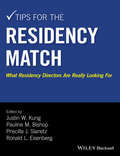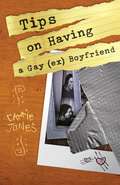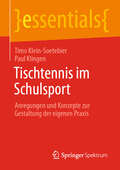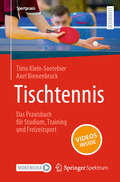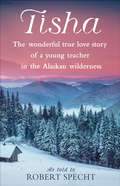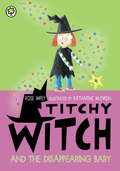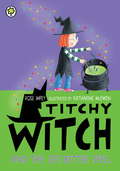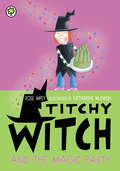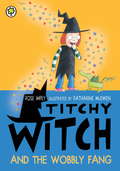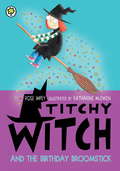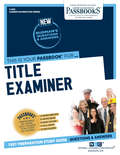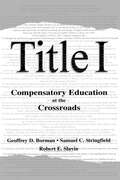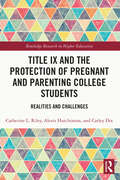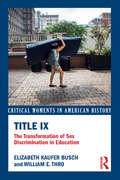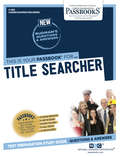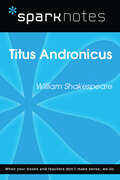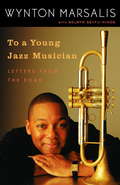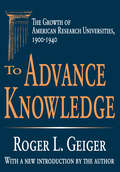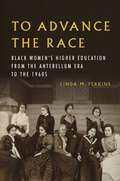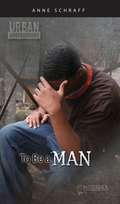- Table View
- List View
Tips for the Residency Match
by Priscilla J. Slanetz Justin W. Kung Ronald L. Eisenberg Pauline M. BishopTips for the Residency Match is a unique guide for medical students applying for residency positions. Packed with hints, tips, and recommendations from both program directors and current residents, Tips for the Residency Match chronologically covers the key information required to excel during the residency application process - from résumé advice and preparing for the interview and beyond. Both insightful and practical, Tips for the Residency Match features a wide spectrum of medical specialties and an extra section for foreign graduates.Tips for the Residency Match is: * Uniquely tailored to the needs of those applying for US residency positions* Written by leading Residency Directors and current residents in the major specialties * Offers unprecedented access to how departmental decisions about the Match are madeBoasting expert advice and a wide scope, Tips for the Residency Match is the ideal companion for those applying for residency positions throughout the United States.
Tips on Having a Gay (Ex) Boyfriend
by Carrie JonesBelle believes that Dylan is her true love--maybe even her soul mate. But Dylan drops the ultimate bomb: he's gay. This beautifully written debut explores what happens when one is forced to see someone in a different light.
Tischtennis im Schulsport: Anregungen und Konzepte zur Gestaltung der eigenen Praxis (essentials)
by Timo Klein-Soetebier Paul KlingenTischtennis bietet als Schulsportart viele Möglichkeiten zur Gestaltung eines interessanten und lehrreichen Unterrichts. In diesem Buch erfahren Lehrkräfte, wie er mit Blick auf unterschiedliche Jahrgangstufen und Schulformen arrangiert werden kann. Leitend sind dabei die didaktischen Grundsätze der Kompetenz- und Spielorientierung sowie des angeleiteten Übens. Die Wahrnehmungs- und Konzentrationsfähigkeit sollen ebenso gefördert werden wie ein sozial verträgliches Kooperieren und sich Verständigen. Tischtennis kann aber auch bei anderen schulischen Gelegenheiten aufgegriffen werden (z. B. in AGs, im Pausensport, bei Klassenfahrten). Auch dazu finden sich im Buch Übungs-, Spielformen und Tipps.
Tischtennis – Das Praxisbuch für Studium, Training und Freizeitsport (Sportpraxis)
by Timo Klein-Soetebier Axel BinnenbruckDieses Lehrbuch verknüpft erstmals wissenschaftliche Erkenntnisse zu der Sportart Tischtennis mit praktischen Handlungsempfehlungen für Training und Wettkampf. Es wurde in enger Zusammenarbeit mit dem Deutschen Tischtennis-Bund (DTTB) konzipiert und richtet sich insbesondere an Sport-Studierende mit Praxismodulen sowie an trainingswissenschaftlich- und pädagogisch-interessierte Trainer*innen und Übungsleiter*innen im Breiten- und Freizeitsport.Mithilfe der Buchinhalte können Sie die technischen und taktischen Elemente der Sportart Tischtennis erlernen und Ihre Spielfähigkeit unter verschiedenen Wettkampfbedingungen – z. B. Doppel und Einzel – weiterentwickeln. Darüber hinaus lernen Sie als Trainer*in praxisnahe didaktisch-methodische Ansätze kennen, um unterschiedliche Schwerpunkte zu setzen und ein angepasstes Tischtennistraining für nahezu jede Zielgruppe planen und durchführen zu können.Abrufbare Videos, beispielsweise zum Aufschlagtraining oder zur Beinarbeitstechnik, veranschaulichen Trainingsinhalte und ermöglichen einen einfachen Praxistransfer. Zusätzlich erhalten Sie einen vertiefenden Einblick in die Besonderheiten, Alleinstellungsmerkmale und aktuellen Entwicklungen im Tischtennis. Insgesamt bietet dieses Lehrbuch die optimale Basis sowohl für Ihre eigene persönliche Entwicklung im Tischtennis als auch für die Wissensvermittlung an zukünftige Instrukteure dieser Sportart.
Tisha: The Wonderful True Love Story of a Young Teacher in the Alaskan Wilderness
by Robert SpechtThe author tells the story as told to him of Anne Hobbs, a woman who went to Alaska in the 1920's to teach, but who had trouble due to her kindness to the Indians there. Copyright © Libri GmbH. All rights reserved.
Titchy Witch And The Disappearing Baby (Titchy Witch #104)
by Rose ImpeyTitchy-witch doesn't think much of her noisy new sister. But when she puts a spell on the baby, it doesn't work quite the way she expects!Don't miss the rest of the Titchy-witch series, now reissued in a smart new livery.
Titchy Witch And The Get-Better Spell
by Rose Impey Katharine McewenWhen Titchy-witch's mum has the witchy-flu, Cat-a-bogus makes a big pot of Get-Better Soup. But Titchy-witch thinks a Get-Better Spell will do more good! Don't miss the rest of the Titchy-witch series, now reissued in a smart new livery.
Titchy Witch And The Get-Better Spell (Titchy Witch #87)
by Rose ImpeyWhen Titchy-witch's mum has the witchy-flu, Cat-a-bogus makes a big pot of Get-Better Soup. But Titchy-witch thinks a Get-Better Spell will do more good!Don't miss the rest of the Titchy-witch series, now reissued in a smart new livery.
Titchy Witch And The Magic Party
by Rose Impey Katharine McewenTitchy-witch is having her first party, but it isn't going very well...until she starts to wave her magic wand! Don't miss the rest of the Titchy-witch series, now reissued in a smart new livery.
Titchy Witch And The Magic Party (Titchy Witch #103)
by Rose ImpeyTitchy-witch is having her first party, but it isn't going very well...until she starts to wave her magic wand!Don't miss the rest of the Titchy-witch series, now reissued in a smart new livery.
Titchy Witch And The Wobbly Fang
by Rose Impey Katharine McewenTitchy-witch has a wobbly fang, but it won't come out on its own. So she decides to give it a little bit of help...using magic! Don't miss the rest of the Titchy-witch series, now reissued in a smart new livery.
Titchy Witch And The Wobbly Fang (Titchy Witch #86)
by Rose ImpeyTitchy-witch has a wobbly fang, but it won't come out on its own. So she decides to give it a little bit of help...using magic!Don't miss the rest of the Titchy-witch series, now reissued in a smart new livery.
Titchy Witch: The Birthday Broomstick
by Rose Impey Katharine McewenTitchy-witch thinks flying is easy-breezy. But when she sets off on her first solo flight, she finds that riding a broomstick is much harder than it looks! Don't miss the rest of the Titchy-witch series, now reissued in a smart new livery.
Titchy Witch: The Birthday Broomstick (Titchy Witch #90)
by Rose ImpeyTitchy-witch thinks flying is easy-breezy. But when she sets off on her first solo flight, she finds that riding a broomstick is much harder than it looks!Don't miss the rest of the Titchy-witch series, now reissued in a smart new livery.
Titchy Witch: Titchy Witch And The Disappearing Baby
by Rose Impey Katharine McewenTitchy-witch doesn't think much of her noisy new sister. But when she puts a spell on the baby, it doesn't work quite the way she expects! Don't miss the rest of the Titchy-witch series, now reissued in a smart new livery.
Title Examiner: Passbooks Study Guide (Career Examination Series)
by National Learning CorporationThe Title Examiner Passbook® prepares you for your test by allowing you to take practice exams in the subjects you need to study. It provides hundreds of questions and answers in the areas that will likely be covered on your upcoming exam.
Title I: Compensatory Education at the Crossroads (Sociocultural, Political, and Historical Studies in Education)
by Robert E. Slavin Samuel C. Stringfield Geoffrey D. BormanThe authors present evidence and theory that explain the positive trend for Title I effects and the recent leveling of this trend in program outcomes. They document the finding that Title I has had a modest positive impact on student achievement.
Title IX and the Protection of Pregnant and Parenting College Students: Realities and Challenges (Routledge Research in Higher Education)
by Catherine L. Riley Alexis Hutchinson Carley DixThis book explores the discrepancies among what protections Title IX provides to pregnant and parenting students, what colleges communicate, and what pregnant and parenting students actually experience. To actually protect pregnant and parenting students, the authors argue that a school must provide multifaceted support that is effectively communicated to an entire campus community, including students who are parenting, who are pregnant, and who may become pregnant. The first part of the book portrays the realities of pregnancy and parenting in college. The chapters illuminate related Title IX applications, population demographics, how unplanned pregnancies in college occur, and physical and mental health challenges that these students often experience. The authors then discuss what compliance with Title IX legally entails and why meeting it is often an afterthought. In the second half of the book, the authors use mixed-methods research to map the compliance landscapes of three schools in the southeast as examples: a large state school, a mid-size private university, and a small private college. Offering eye-opening interviews with pregnant and parenting students, interdisciplinary research, and proposals for multifaceted support and communication on college campuses, this volume will engage students, scholars, and activists with an interest in higher education administration, educational policy, reproductive health, bioethics, gender studies, and rhetoric.
Title IX: The Transformation of Sex Discrimination in Education (Critical Moments in American History)
by Elizabeth Kaufer Busch William E. ThroThis book examines the history and evolution of Title IX, a landmark 1972 law prohibiting sex discrimination at educational institutions receiving federal funding. Elizabeth Kaufer Busch and William Thro illuminate the ways in which the interpretation and implementation of Title IX have been transformed over time to extend far beyond the law's relatively narrow statutory text. The analysis considers the impact of Title IX on athletics, sexual harassment, sexual assault, and, for a time, transgender discrimination. Combining legal and cultural perspectives and supported by primary documents, Title IX: The Transformation of Sex Discrimination in Education offers a balanced and insightful narrative of interest to anyone studying the history of sex discrimination, educational policy, and the law in the contemporary United States.
Title Searcher: Passbooks Study Guide (Career Examination Series)
by National Learning CorporationThe Title Searcher Passbook® prepares you for your test by allowing you to take practice exams in the subjects you need to study. It provides hundreds of questions and answers in the areas that will likely be covered on your upcoming exam.
Titus Andronicus (SparkNotes Literature Guide Series)
by SparkNotesTitus Andronicus (SparkNotes Literature Guide) by William Shakespeare Making the reading experience fun! Created by Harvard students for students everywhere, SparkNotes is a new breed of study guide: smarter, better, faster. Geared to what today's students need to know, SparkNotes provides: *Chapter-by-chapter analysis *Explanations of key themes, motifs, and symbols *A review quiz and essay topicsLively and accessible, these guides are perfect for late-night studying and writing papers
To A Young Jazz Musician: Letters From The Road
by Wynton Marsalis Selwyn Seyfu HindsInTo a Young Jazz Musician,the renowned jazz musician and Pulitzer Prize—winning composer Wynton Marsalis gives us an invaluable guide to making good music–and to leading a good life. Writing from the road “between the bus ride, the sound check, and the gig,” Marsalis passes on wisdom gained from experience, addressed to a young musician coming up–and to any of us at any stage of life. He writes that having humility is a way to continue to grow, to listen, and to learn; that patience is necessary for developing both technical proficiency and your own art rather than an imitation of someone else’s; and that rules are indispensable because “freedom lives in structure. ” He offers lessons learned from his years as a performer and from his great forebears Duke Ellington, Charlie Parker, and others; he explores the art of swing; he discusses why it is important to run toward your issues, not away; and he talks about what to do when your integrity runs up against the lack thereof in others and in our culture. He poetically expresses our need for healers: “All of it tracks back to how you heal your culture, one patient at a time, beginning with yourself. ” This is a unique book, in which a great artist offers his personal thoughts, both on jazz and on how to live a better, more original, productive, and meaningful life. To a Young Jazz Musician is sure to be treasured by readers young and old, musicians, lovers of music, and anyone interested in being mentored by one of America’s most influential, generous, and talented artists. From the Hardcover edition.
To Advance Knowledge: The Growth of American Research Universities, 1900-1940
by Roger L. GeigerAmerican research universities are part of the foundation for the supremacy of American science. Although they emerged as universities in the late nineteenth century, the incorporation of research as a distinct part of their mission largely occurred after 1900. To Advance Knowledge relates how these institutions, by 1940, advanced from provincial outposts in the world of knowledge to leaders in critical areas of science. This study is the first to systematically examine the preconditions for the development of a university research role. These include the formation of academic disciplines--communities that sponsored associations and journals, which defined and advanced fields of knowledge. Only a few universities were able to engage in these activities. Indeed, universities before World War I struggled to find the means to support their own research through endowments, research funds, and faculty time. To Advance Knowledge shows how these institutions developed the size and wealth to harbor a learned faculty. The book illustrates how arrangements for research changed markedly in the 1920s when the great foundations established from the Rockefeller and Carnegie fortunes embraced the advancement of knowledge as a goal. Universities emerged in this decade as the best-suited vessels to carry this mission. Foundation resources made possible the development of an American social science. In the natural sciences, this patronage allowed the United States to gain parity with Europe on scientific frontiers, of which the most important was undoubtedly nuclear physics. The research role of universities cannot be isolated from the institutions themselves. To Advance Knowledge focuses on sixteen universities that were significantly engaged with research during this era. It analyzes all facets of these institutions--collegiate life, sources of funding, treatment of faculty--since all were relevant to shaping the research role.
To Advance the Race: Black Women's Higher Education from the Antebellum Era to the 1960s
by Linda M. PerkinsFrom the United States' earliest days, African Americans considered education essential for their freedom and progress. Linda M. Perkins’s study ranges across educational and geographical settings to tell the stories of Black women and girls as students, professors, and administrators. Beginning with early efforts and the establishment of abolitionist colleges, Perkins follows the history of Black women's post–Civil War experiences at elite white schools and public universities in northern and midwestern states. Their presence in Black institutions like Howard University marked another advancement, as did Black women becoming professors and administrators. But such progress intersected with race and education in the postwar era. As gender questions sparked conflict between educated Black women and Black men, it forced the former to contend with traditional notions of women’s roles even as the 1960s opened educational opportunities for all African Americans. A first of its kind history, To Advance the Race is an enlightening look at African American women and their multi-generational commitment to the ideal of education as a collective achievement.
To Be A Man (Urban Underground Series)
by Anne SchraffWritten for young adults, the Urban Underground series confronts issues that are of great importance to teens, such as friendship, loyalty, drugs, gangs, abuse, urban blight, bullies, and self-esteem to name a few. More than entertainment, these books can be a powerful learning and coping tool when a struggling reader connects with credible characters and a compelling storyline. The highly readable style and mature topics will appeal to young adult readers of both sexes and encourage them to finish each novel.
